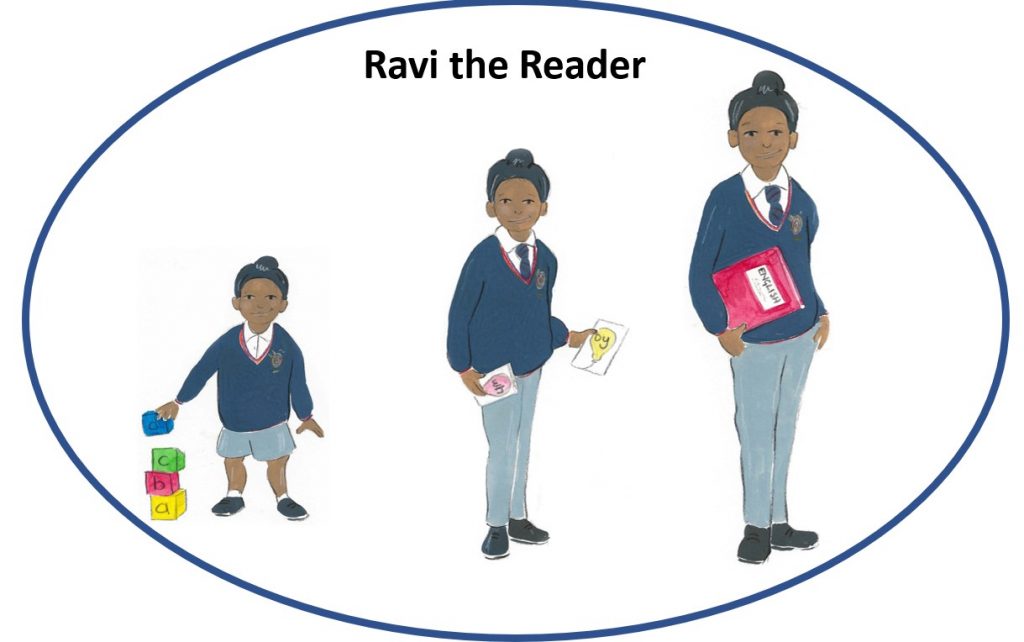
Intent – This is what we want for our children
A passion for reading and a love of books is central to our educational ethos at Barley Fields Primary School. In every year group, we aim for all children to discover the joy in reading high-quality children’s literature and enjoy books by a range of authors. We believe that the teaching of reading is integral to a child’s understanding and appreciation of the world around them. We want all children at Barley Fields to find pleasure in reading and enjoy escaping into the worlds of imagination it has to offer; reading is used as a platform that allows our children to see beyond what they already know, share in a range of experiences and develop vocabulary and knowledge of the wider world. We aim to nurture the behaviours that children will need to be discerning and critical readers through quality-first teaching, utilising a sequence of teaching strategies.
Our central aim is to ensure every child becomes an enthusiastic, fluent, competent and independent reader in order that they can access the rest of the curriculum. We endeavour to build home-school partnerships that enable parents and carers to have the confidence to support their children with reading at home.
Implementation – This is what it will look like in the classroom.
Using current research, we have carefully designed a progressive and structured reading curriculum which evolves as our children progress through the school. Each year group teaches reading utilising a variety of approaches and teaching strategies which we have carefully selected and chosen to match the needs of our children. These include:

These strategies guide children on their reading journey in their development of fluency, understanding and skills development. As part of our home-school partnerships, children have regular opportunities to read aloud both with and to adults in school and at home. We allocate time regularly to develop the habit of quiet reading and to listen to stories being read aloud by adults. The teaching of reading is a timetabled part of every day and teachers utilise the strategies identified above in order to effectively deliver the curriculum. Our medium-term schemes of learning ensure children experience balance within the curriculum and different teaching strategies are employed as the children develop more independence in their reading
Reading Resources
In school we have an extensive and rich literary environment with the provision of high-quality reading materials in all areas of the school including fiction, non-fiction, poetry and reference books. Teachers enhance reading for pleasure by providing a wealth of rich texts linked to classic and contemporary children’s authors as well as the wider curriculum. Class readers, from each year group’s reading spine, are enjoyed by teachers and children alike.
In school, we utilise a book band system which grades our reading resources to age related expectations. Each level has its own colour and in the emergent stages, a selection of different phonetically matched reading scheme books are used to support early reading. Children in EY and KS1 begin with decodable reading books linked directly to their phonic skills and at the base of our curriculum we use progressive and decodable reading schemes by Smart Kids and Schofield and Sims. Primarily, for our emergent readers we use resources from DFE-approved published schemes including:

The book bands provide a pathway of reading progression and support teachers in making decisions to meet the needs of individual pupils, bringing variety and depth to children’s reading diets. Using banded books, children are able to choose books freely from a structured range of texts making reading independent and enjoyable. At each key stage, children have the opportunity to choose ‘real’ books that appeal to their reading tastes whilst also matching their ability. In key stage two, book bandings link to the expected children’s reading levels, interests and the complexity of the texts that they encounter.
We use a breadth of resources to support and enhance our reading curriculum with a key focus on developing understanding, comprehension and to practise skills. These include:

We actively involve parents in the teaching of reading . Every child will bring reading materials home daily along with a personal Reading Record. This book is used across the school and we ask parents to make constructive comments and record when children practice their reading at home. We value parent support in completing the Reading Record as it has a major impact on children’s progress.
Our curriculum characters for Reading are designed to represent the curriculum end points as children progress through school. Our children are regularly exposed to the core skills and knowledge needed to develop as a reader with the use of the school curriculum character.

Impact – this is what it will mean for our children.
Through the use of robust assessment and tracking systems, the impact of our reading curriculum and our teaching and learning pedagogy leads to children who:
- Are inspired, motivated and enthusiastic about reading
- Enjoy listening to stories read aloud
- Read fluently and confidently in a range of contexts
- Employ a range of decoding and syntactic strategies to support their reading
- Read with understanding and respond to a range of comprehension questions
- Read aloud with appropriate expression and intonation
- Achieve very well and made good progress from their starting points
We are very proud of our children’s development of skills in reading which in turn lead to excellent attainment outcomes. We continually observe and formatively assess children against age-related reading objectives and use this information to plan the next steps in their learning and to challenge and consolidate their skills. By the end of each key stage, pupils are expected to know, apply and understand the skills and techniques specified in the relevant curriculum plans.
